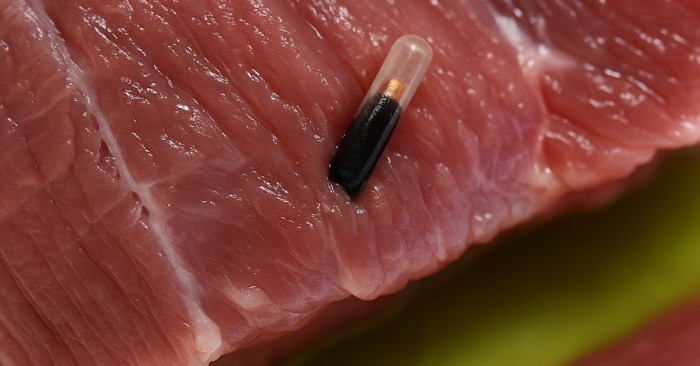For years, I’d been going to the same supermarket. The staff knew me, always smiled politely, and I never once doubted the quality of their products. It became a quiet habit — a kind of unspoken guarantee: familiar place means safe place.
But one evening, on my way home, I decided to stop by a new store. It looked spotless — shiny floors, bright lights, perfectly arranged displays. Without hesitation, I picked up a package of beef. Just an ordinary purchase on an ordinary day. Or so I thought.
At home, I unwrapped the meat and began to prepare dinner as usual: rinsed it, placed it on the cutting board, took the knife. But at the very first cut, something felt wrong — there was a resistance inside, something firm, elastic, unnatural. I thought it might be a tendon or a small bone. But when I cut deeper, my heart nearly stopped.
Inside the meat was a tiny metal object. Not a bone. Not gristle. A small, shiny piece of machinery. I carefully pulled it out and held it up to the light. It looked like a sensor — or part of some kind of tracking device.
The thought that this could have ended up on my family’s dinner plates made me shiver. What if we had swallowed it? What if it contained a battery or chemicals? The mere idea made me feel sick.
I couldn’t sleep that night. I started searching online, trying to understand what it could be. I discovered that on large farms, animals are sometimes fitted with sensors — for tracking or monitoring health. But by regulation, those devices must be removed before the meat ever reaches consumers. So how did this one end up in my kitchen?
Was it a worker’s mistake? Carelessness? Or just a freak accident? Whatever the reason — the fact itself was terrifying.
That night changed the way I think about food. A clean package and a pretty label don’t mean safety. We have no idea what happens before the product reaches our fridge. One tiny overlooked detail — and danger is already sitting on the cutting board.
I stared at that cold little piece of metal and felt both fear and gratitude. Fear — for what could have happened. Gratitude — that it didn’t.
Now I treat food differently. I take my time. I check meat, fish, vegetables — carefully. It may take a few extra minutes, but my family’s health is worth it.
I’m not telling this story to frighten anyone, but to remind you: trust should always go hand in hand with attention. If something feels strange — stop and look closer. It might save you from trouble.
Even now, I can still see that metallic glint under the kitchen light — and the shiver that ran down my spine. But right beside it was an overwhelming sense of relief: everything turned out fine.
Food should bring warmth, flavor, and comfort — not hidden danger. So my advice is simple: never ignore small details. Sometimes, they’re what protect what’s most precious.







